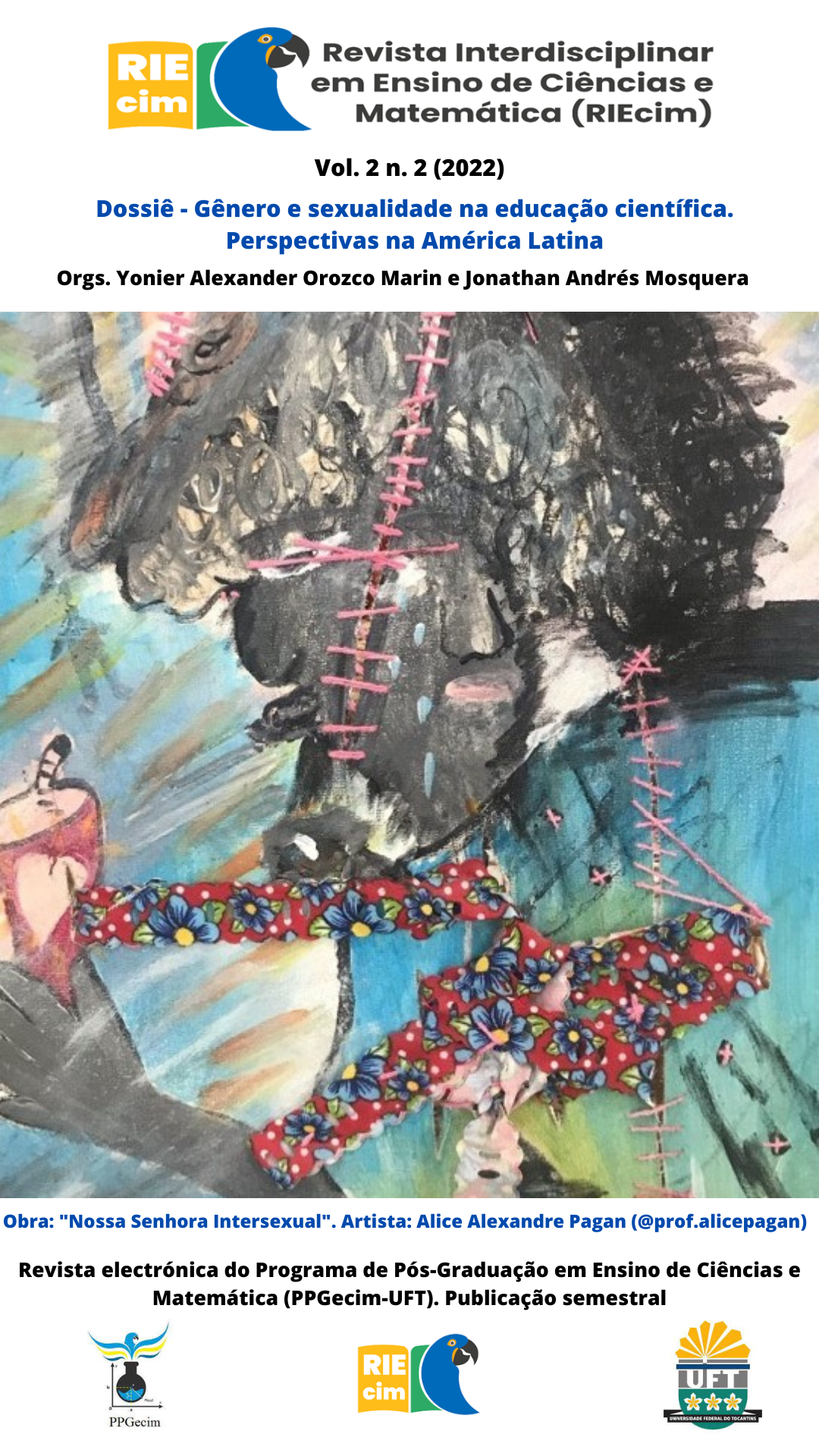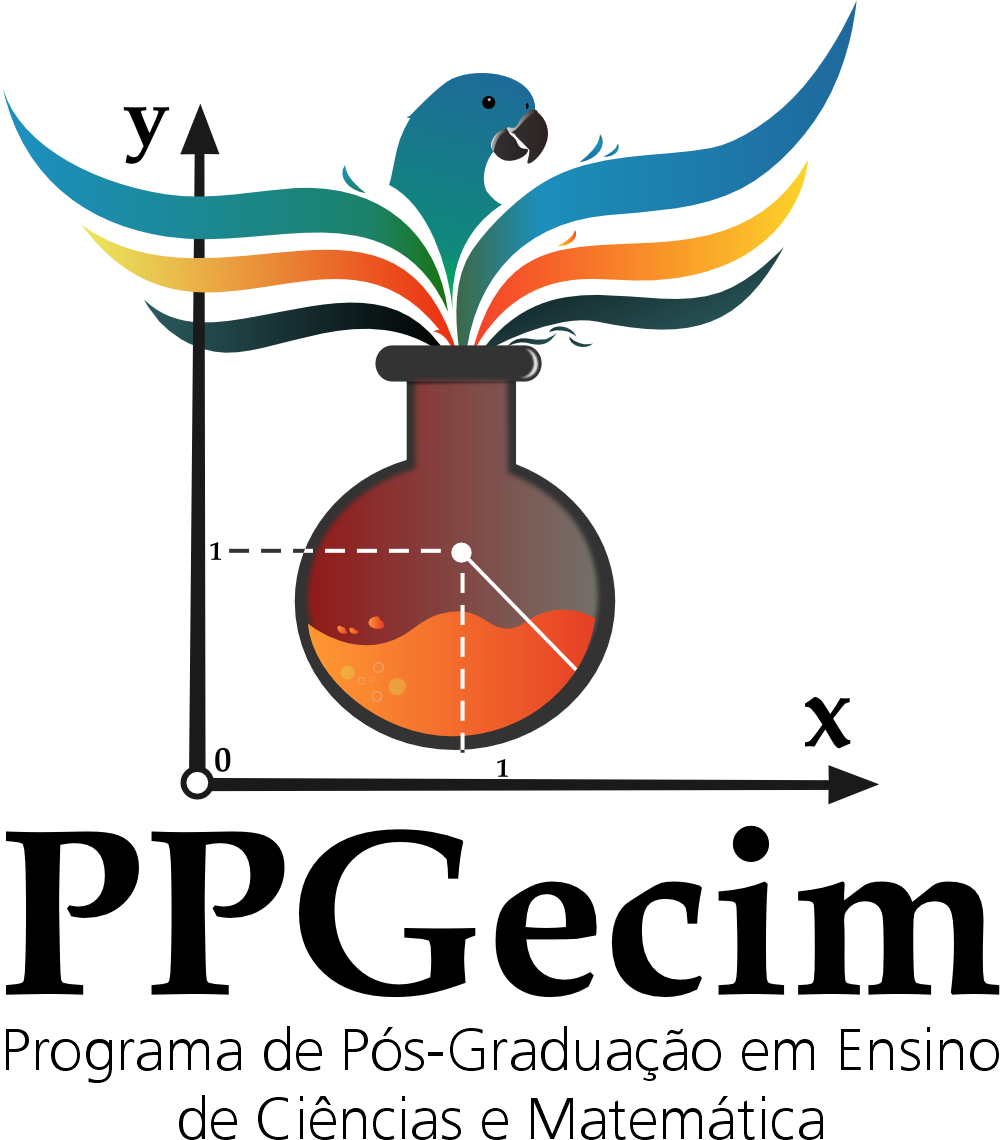EPISTEMOLOGÍAS DECOLONIALES Y FEMINISTAS
¿qué ciencia aprendemos y enseñamos los y las profesoras de ciencias?
DOI:
https://doi.org/10.20873/riecim.v2i2.14835Keywords:
Epistemologia, eurocentrismo, androcentrismo, docentes de ciencias.Abstract
This article reflects on the different criticisms that are made from decolonial and feminist studies to Western epistemology, exposing the complaints about eurocentrism, androcentrism, racism and epistemic sexism, objectivity, universality, rationality, naturalization and the binarism; and the gender and race subtexts behind them. With the purpose that science teachers reflect on the biases that we may be reproducing in our teaching if we do not take into account what science we learn and teach.
References
BAEZA, Enrique Antileo. Trabajo racializado. Una reflexión a partir de datos de población indígena y testimonios de la migración y residencia mapuche en Santiago de Chile. Meridional: Revista Chilena de Estudios Latinoamericanos, [s. l], v. 4, p. 71-96, abr. 2015. Disponível em: https://meridional.uchile.cl/index.php/MRD/article/view/36531. Acesso em: 29 out. 2022.
CASTAÑEDA, Martha Patricia. Metodología de la investigación feminista. México: Guatemala: Centro
de Interdisciplinarias En Ciencias y Humanidades (Ceiihc)., 2008. CICCIA, Lucia. La dicotomía de los sexos puesta en jaque desde una perspectiva cerebral. Descentrada, [S. l.], v. 2, n. 2, p. e052, 2018. Disponível em: https://www.descentrada.fahce.unlp.edu.ar/article/view/DESe052. Acesso em: 31 oct. 2022.
COLLINS, Patricia Hill. Black feminist thought: Knowledge, consciousness, and the politics of empowerment. Routledge, 2002.
CUMES, Aura. Multiculturalismo, género y feminismos: Mujeres diversas, luchas complejas. In: PEQUEÑO, Andrea (comp.). Participación y políticas de mujeres indígenas en contextos latinoamericanos recientes. Quito: Flacso, Sede Ecuador, 2009. p. 29-52.97
ESPINOSA-MIÑOSO, Yuderkys. Una crítica descolonial a la epistemología feminista crítica. El Cotiniano, Distrito Federal, México., v. 184, p. 7-12, mar. 2016. Disponível em: http://www.redalyc.org/articulo.oa?id=32530724004. Acesso em: 31 out. 2022.
FERNÁNDEZ RIUS, Género y ciencia: entre la tradición y la transgresión. In: GRAF, Norma Blazquez; FLORES, Fátima; RIOS, Maribel (org.). Investigación feminista: epistemología, metodología y representaciones sociales. México: Centro de Investigaciones Interdisciplinares En Ciencias y Humanidades. Centro Regional de Investiga, 2012. p. 21-38.
GARGALLO, Francesca. Feminismos desde Abya Yala. Ideas y proposiciones de las mujeres de 607 pueblos en nuestra América. Ciudad de México: Editorial Corte y Confección, 2014. Disponível em: https://francescagargallo.files.wordpress.com/2014/01/francesca-gargallo-feminismos-desde-abya yalaene20141.pdf. Acesso em: 11 dez. 2020.
GRAF, Norma Blazquez. Epistemología feminista: temas centrales. In: GRAF, Norma Blazquez; FLORES, Fátima; RIOS, Maribel (org.). Investigación feminista: epistemología, metodología y representaciones sociales. México: Centro de Investigaciones Interdisciplinares En Ciencias y Humanidades. Centro Regional de Investiga, 2012. p. 21-38.
GROSFOGUEL, R. Islamofobia epistémica y ciencias sociales coloniales. Astrolabio, [S. l.], n. 6, 2011. DOI: 10.55441/1668.7515.n6.323. Disponível em: https://revistas.unc.edu.ar/index.php/astrolabio/article/view/323. Acesso em: 31 oct. 2022.
HARDING, Sandra. “Rethinking Standpoint Epistemology: What is ‘strong objectivity’?”, In: Sandra Harding (ed.). The Feminist Standpoint Theory Reader. Intellectual and Political Controversies, New York, Routledge, 2004, pp. 127-140.
HARDING, Sandra. Is There a Feminist Method?, In: Sandra Harding (ed.). Feminism and Methodology, Indianapolis, Bloomington, Indiana University Press, 1987. p.9-34
LUGONES, MARÍA. Colonialidad y Género. Tabula Rasa, Bogotá, n. 9, pág. 73-102, diciembre de 2008. Disponible en <http://www.scielo.org.co/scielo.php?script=sci_arttext&pid=S1794-24892008000200006&lng=en&nrm=iso>. acceso el 31 de octubre de 2022.
LUGONES, María. Hacia un feminismo descolonial. La Manzana de La Discordia, [S.L.], v. 6, n. 2, p.105-119, 18 mar. 2011. Universidad del Valle. http://dx.doi.org/10.25100/lamanzanadeladiscordia.v6i2.1504. Disponível em: https://manzanadiscordia.univalle.edu.co/index.php/la_manzana_de_la_discordia/%20article%20/view%2
/. Acesso em: 30 jan. 2021.
MAFFIA, Diana. Género y políticas públicas en ciencia y tecnología. In: GRAF, Norma Blazquez; FLORES, Fátima; RIOS, Maribel (org.). Investigación feminista: epistemología, metodología y representaciones sociales. México: Centro de Investigaciones Interdisciplinares En Ciencias y Humanidades. Centro Regional de Investiga, 2012. p. 21-38.
NOGALES, Helena Katherina. Colonialidad de la naturaleza y de la mujer frente a un planeta que se agota. Ecología Política, [s. l], v. 2017, n. 54, p. 8-11, dez. 2017. Disponível em: https://www.jstor.org/stable/44645630. Acesso em: 21 nov. 2020.98
OYEWÙMÍ, Oyèrónké. La invención de las mujeres. Una perspectiva africana sobre los discursos occidentales del género. Bogotá, Colombia. Editorial en la frontera, 2017.
PÉREZ, Elena Martínez. Los ecofeminismos como vanguardia en la interseccionalidad feminista. Géneros, Colima, v. 24, n. 21, p. 133-150, ago. 2017. Disponível em: http://revistasacademicas.ucol.mx/index.php/generos/article/view/1530. Acesso em: 21 nov. 2020.
QUIJANO, Anibal. Colonialidad del poder y clasificación social. Cuestiones y Horizontes, [S.L.], p. 325-370, 1 jan. 2020. Consejo Latinoamericano de Ciencias Sociales. CLACSO. http://dx.doi.org/10.2307/j.ctv1gm019g.12.
Downloads
Published
Versions
- 2023-01-04 (3)
- 2023-01-04 (2)
- 2022-12-30 (1)
How to Cite
Issue
Section
License
Copyright (c) 2022 Mara Karidy Polanco Zuleta

This work is licensed under a Creative Commons Attribution-NonCommercial 4.0 International License.
Copyright Policy
Copyrights are retained by the authors, who grant RIEcim the exclusive rights for first publication. Authors will not be remunerated for the publication of their work in this journal. Authors are permitted to enter into separate, additional contractual arrangements for the non-exclusive distribution of the work's published version in this journal (e.g., post it to an institutional repository, on a personal website, publish a translation, or as a book chapter), with acknowledgement of authorship and initial publication in this journal. The Journal's editors have the right to make textual adjustments and adaptations to conform to publication standards.
Open Access Policy
This journal provides immediate open access to its content, following the principle that freely providing scientific knowledge to the public contributes to the global democratization of knowledge. Users can read, download, copy, distribute, print, search, or use the content for any legal purpose, respecting national copyright laws and without seeking prior permission from the publisher or the author. The opinions presented in the articles are the responsibility of the authors. The Journal does not charge Article Processing Charges (APCs).
Licensing Policy - Usage License
Licensed under the Creative Commons Attribution-NonCommercial 4.0 International (CC BY-NC 4.0) License. This license allows sharing, copying, redistributing the manuscripts published in RIEcim in any medium or format. Additionally, it allows adapting, remixing, transforming, and building upon the material, as long as proper credit is given to the author and initial publication in this journal is acknowledged.


























